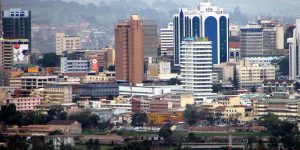According to NPA, Uganda’s economy requires an urgent intervention by injecting capital to jumpstart the critical sectors into gainful production.
By Nangayi Guyson, nangayi.guyson@alleastafrica.com
Kampala, Uganda –Uganda government needs about shs2.9 trillion to boost its staggering economy. The national planning authority (NPA) said this week during their 7th national development policy forum titled “unlocking Uganda’s export potential”
According to NPA, Uganda’s economy requires an urgent intervention by injecting capital to jumpstart the critical sectors into gainful production.
Uganda will use a policy known as Economic stimulus to work around its economy. This policy consists of attempts by governments or government agencies to financially stimulate an economy by use of monetary or fiscal policy changes to kickstart growth during a recession. Governments can accomplish this by using tactics such as lowering interest rates, increasing government spending and quantitative easing, and many others.
Uganda will do this by engaging in rehabilitating and replanting its coffee, establish Uganda’s own tea auctioning Center,distributing 8900 metric tons of cotton seeds to farmers, increasing fish stocks and introducing fishing holidays,aggressive product development and marketing of tourism according to the information shared out at the 7th National Development forum organized by The National Planning Authority (NPA) under their new Strategy paper titled “unlocking Uganda’s Export Potential”.
Rachel Sebudde, a senior Economist at the World Bank Group advised that “ the ability to raise productive can be enhanced by facilitating access to larger markets and pushing farmers to be more competitive .Export trade can expand production diversifythe economy and create more jobs, this in turn will reduce Uganda’s vulnerability to external shops”. She said.
Minister for Finance David Bahati said “we very serious and strict on this issue of changing the shape of our economy. We always release money to the concerned intuitions but they don’t pay people to do the work as expected. We shall hold any who messes up accountable “the minister said.

Norbert Mao, DP president wonders what has happened to the economy, he questions “is our economy independent? Is it integrated? Is it self-sustaining? Is it even national?”Moa Questioned.
Mondo Kagonyera, a former Cabinet Minister in President Musveni’s government said “the problem we have in this country is that we somehow what to do but don’t it,” He said.
Uganda’s economy continues to be characterized with heightened uncertainty of Marco economic parameters resulting from both domestic and external shocks. Inflation accelerated from 5% in January 2011 to 21.4%August, 28.3% in September and 30.5% in October 2011.
The Ugandan shilling has been depreciating all through against USD for the last three years. Last year, Ugandan shilling jumped from selling at 2900 to 3200 and this year is selling at 3550 against the USD and yet the previous appreciationstood at Ugx 2,400 per USD.

Despite the depreciation of the shilling. There’s also a growing sense of un-predictability in Uganda’s Economy crippled with the financial sector having ever higher numbers of non-performing loans (NPLs). For instance, Banks like Crane Bank, had been crippled by NPLs and was subsequently taken over by the Central Bank last October and sold to DFCU Bank.
It should be noted that interest rates are also increasing, currently above 30% following the Central bank’s tight monetary Policy. This is making it rather hard for the business community, which depends on credit to borrow and expand their businesses.
Uganda’s economic struggles came under the spotlight this last month when the World Bank published its updated economic outlook when the Managing Director of the IMF made an official visit to the country.
Bank of Uganda has accepted that Uganda’s economy is struggling but has put the blame on the global economic and political landscape that has changed significantly following the US presidential election.
The BOU report of December last year says the high degree of uncertainty surrounding the economic policies of the new administration is expected to persist for some time, creating a more challenging and volatile environment for emerging and frontier markets in particular. Higher US long bond yields, along with expectations of a tighter stance of monetary policy by the US Fed than previously expected, have contributed to the reversal of the recent positive sentiment towards emerging and frontier markets. The prospect of rising protectionism and its implications for world trade are also a concern. These developments have also affected capital flows to Uganda, with implications for the shilling exchange rate.
The report explains more that despite the unfavorable international economic environment, the domestic economy has remained resilient. Macroeconomic stability has been maintained, with reasonable rates of growth, low inflation, and adequate international reserves. Nonetheless, the inherent risks in the global economy call for coherent domestic policies in order to manage market expectations and avoid erosion of confidence in the economy.
On Uganda’s Budget, the bank also says the implementation of the budget for FY 2016/17 seems to have faced challenges in the initial phase of budget execution. During the first four months of FY 2016/17, URA revenue collections amounted to Shs. 3,641.3 billion, representing a shortfall of Shs. 165.6 billion when compared to the target of Shs. 3,806.9 billion. Total domestic revenue (both URA and Non-URA) amounted to Shs. Shs. 3,742.7 billion compared to the target of Shs. 3,939.3 billion representing a shortfall of Shs. 196.6 billion.
The Uganda’s public debt burden has risen by 12.7 percentage points to 38.6 per cent of GDP in 2016/17 from 25.9 per cent of GDP in 2012/13 and is projected to continue rising towards 45% of GDP by 2020. Debt as a percentage of revenues has risen by 54pp since 2012 and is expected to exceed 250 per cent by 2018.
Copyright ©2017 Alleastafrica.com All rights reserved. The information contained in Alleastafrica.com may not be published, broadcast, rewritten, or redistributed without the prior written authority of Alleastafrica.com



